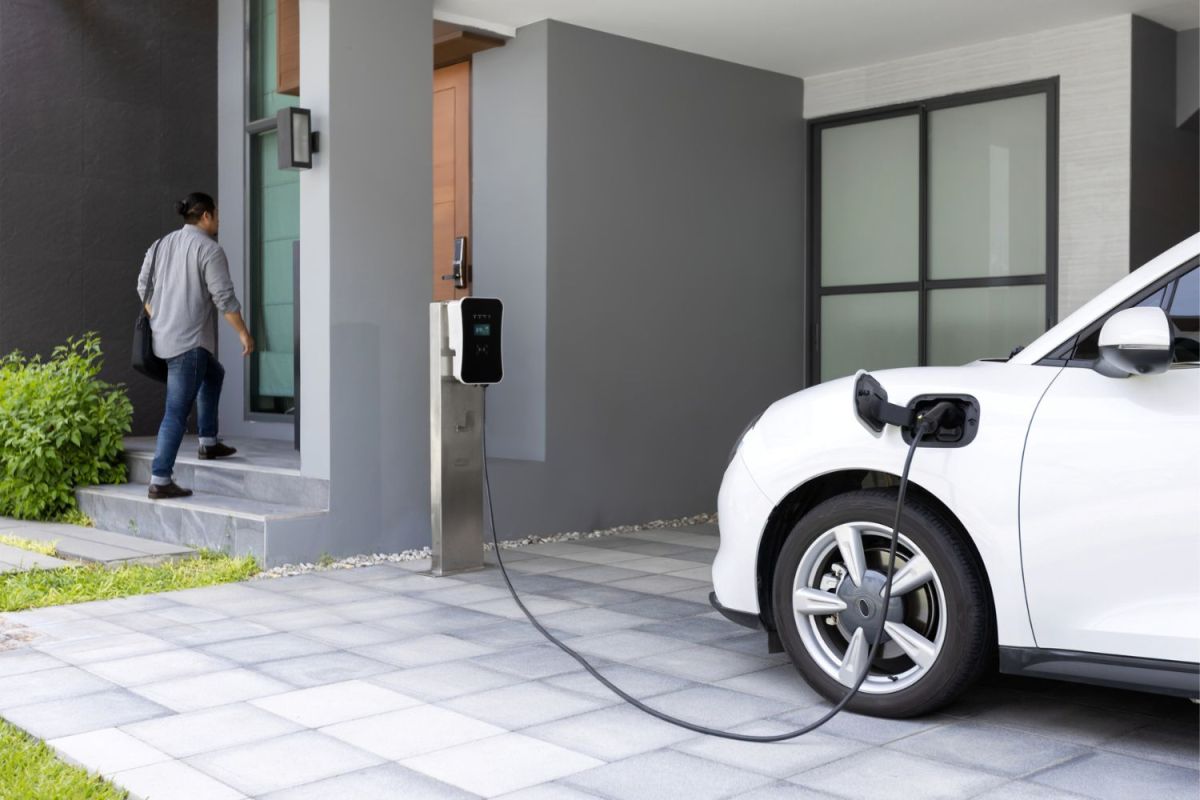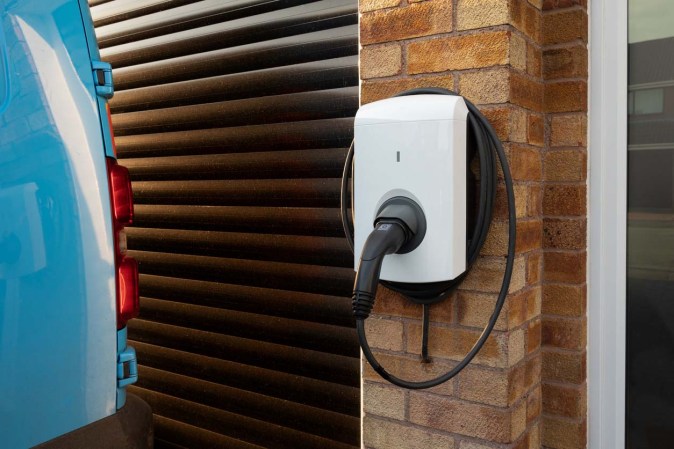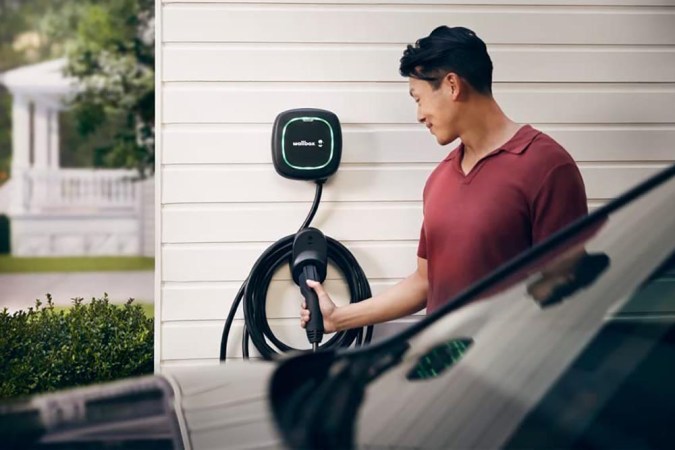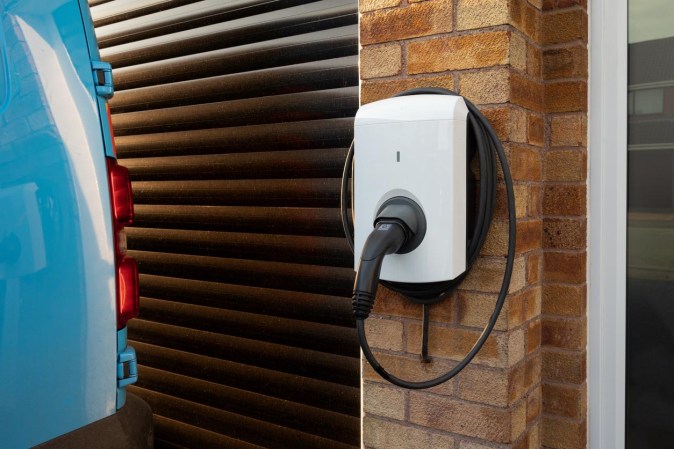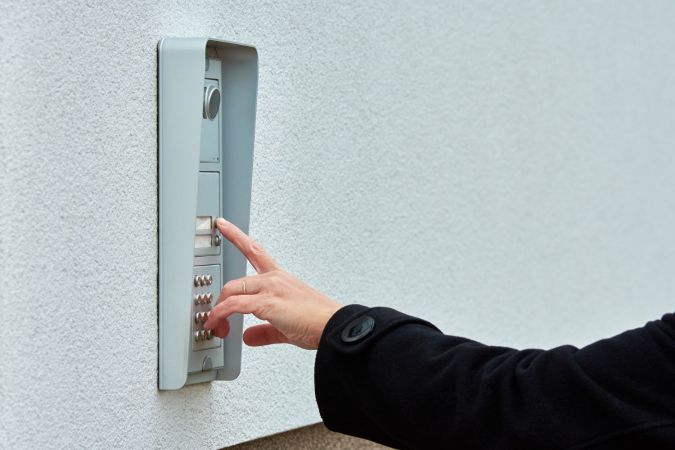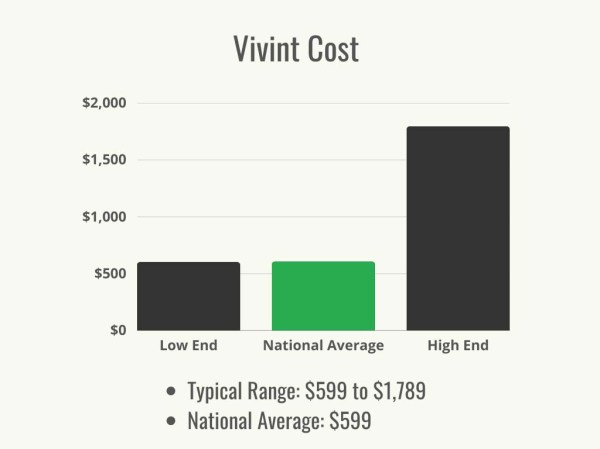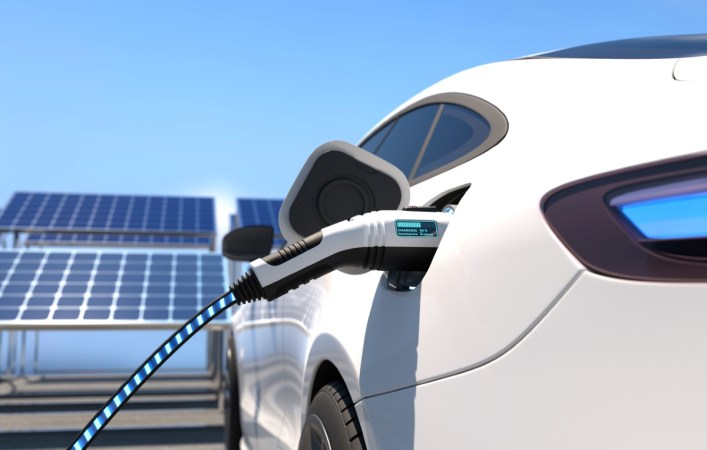We may earn revenue from the products available on this page and participate in affiliate programs. Learn More ›
Highlights
- The typical cost range to install an EV charger in a home is from $546 to $1,374, while the national average cost is $959.
- Some of the factors that can affect EV charger installation costs include the type of charger, the type of connection, the charger brand, the installation location, and the cost of labor and permits.
- There are several benefits of installing an EV charger at home, such as convenience, cost-effectiveness, predictability, vehicle battery health, and increased property value.
- Hiring a professional to install an EV charger is strongly recommended since it involves working with electrical wires; a mistake by a DIYer could lead to electrical faults, or even electrocution or fire.
Electric vehicles (EVs) are becoming more popular with drivers in the U.S. who want to end their reliance on gasoline. While EVs vary in make, model, and color, they all have one thing in common: They must be recharged regularly.
Public electric car chargers can be found in parking lots, such as at shopping centers and airports. They’re also commonly found at hotels and resorts for guests, while some gas stations have even started installing EV charging stations to accommodate the needs of their customers.
While public EV charging stations are necessary and appreciated, most owners of electric vehicles will agree that there’s nothing like the convenience of having a charging station at home. It provides peace of mind, cost savings, and faster charging speeds. But how much does this convenience cost?
According to HomeAdvisor, the cost to install an EV charger at home ranges from $546 to $1,374. On average, homeowners pay $959 to install an at-home charging station, with the cost varying based on the charger type and brand. This guide can help homeowners learn more about how to calculate EV charger installation costs.
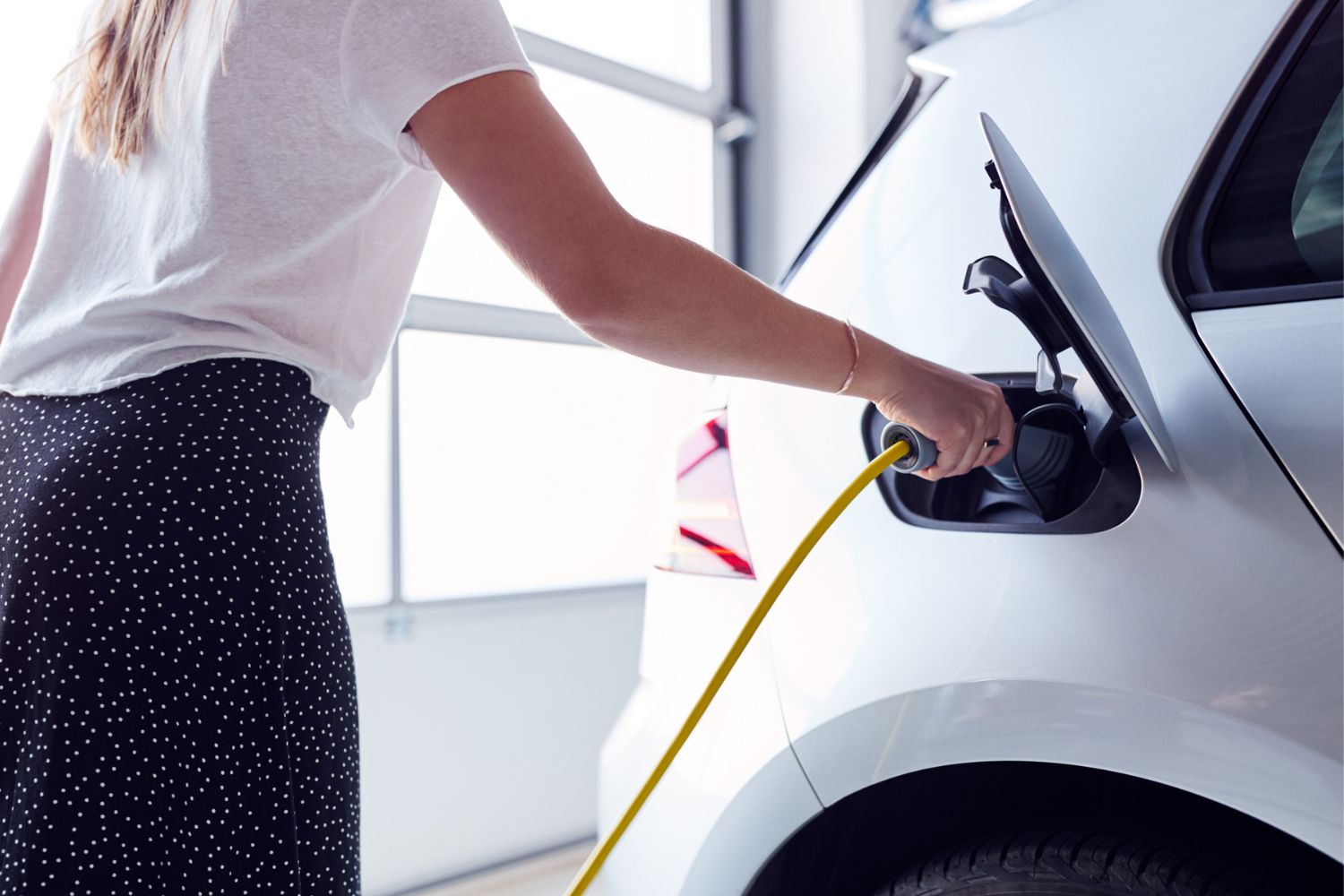
Factors in Calculating the Cost to Install an EV Charger at Home
Determining the cost to install an EV charger at home depends on a few key factors. While the national average cost to install an EV charger is $959, several elements can influence the final cost, including the charger type, connection method, and installation location. Homeowners will want to remember the following factors when budgeting for an EV charger installation at home.
EV Charger Type
There are three types of car charging stations, which are broken down by levels.
- Level 1 chargers are free with an electric vehicle purchase, though some drivers buy back-up or replacement Level 1 chargers. These chargers does not require any sort of electric car charger installation. Instead, they can be plugged directly into any 120-volt outlet. While they’re simple to set up, they charge slowly and may not hold enough to meet a day’s mileage.
- Level 2 chargers are the most common among electric car owners. They’re affordable and charge batteries much more quickly. Most models offer a full charge in just a few hours. However, they require a 240-volt outlet, so homes tend to require electrical modifications with this charger type.
- Level 3 chargers are designed for commercial use and can fully charge a battery in under an hour. Most homes can’t accommodate such a large and powerful charger.
Connection Type
Electric car owners have a couple of options when it comes to how their charging station is connected to their home, with the main two being plugged in and hardwired.
Plugged-in connectors require a 240-volt wall outlet. Some homes may already have this type of outlet, commonly found in the laundry room for a clothes dryer, or one may already be installed in the garage as well. If not, including EV outlet installation cost in the budgeting process is wise.
The main benefit of plugged-in connectors is that they’re portable and can be easily moved, repaired, or replaced as needed. As long as the outlet is installed and available, an EV charger can be connected quickly and conveniently.
A hardwired connection is wired directly into a home. It can’t be removed easily since it’s connected to a home’s electrical wiring. However, hardwired connections can be used outdoors and are less expensive.
| Connection Type | Average Cost (Materials and Labor) |
| Plugged In | $1,000 to $2,200 |
| Hardwired | $850 to $1,800 |
Charger Brand
There are several manufacturers of EV chargers. Some have a better reputation than others and typically have price ranges to match. While some electric vehicle owners have to go with the same brand for their car and charger, other makes and models are compatible with universal chargers.
Since different brands offer different features and quality levels, each manufacturer has a unique price range. Generally speaking, chargers that offer higher charging speeds, extended warranties, and dedicated customer support will likely come with a higher starting price point.
However, more-affordable brands shouldn’t be eliminated on price alone. Electric vehicle owners will want to explore each brand in their price point to find one that meets their needs.
| Brand | Average Cost (Materials and Labor) |
| Bosch | $1,100 to $1,600 |
| ChargePoint | $1,300 to $1,500 |
| Enphase | $1,000 to $1,500 |
| JuiceBox | $1,200 to $1,400 |
| Siemens | $1,200 to $1,400 |
| Tesla | $1,100 to $1,600 |
| Webasto | $1,000 to $1,300 |
Installation Location
One detail for homeowners to consider when preparing for an electric car is where to install the charger. Deciding between an interior or exterior location can influence the overall installation budget and the homeowner’s experience of an at-home EV charger.
Interior locations are more protected from the elements. They’re also less visible to passersby, reducing the risk of vandalism. However, interior charging stations limit parking options and occupy interior garage space.
Exterior locations allow for more flexible parking and keep chargers and cables out of interior living spaces. However, they require weatherproofing and may not be an aesthetically pleasing addition for some homeowners.
| Location | Average Cost (Materials and Labor) |
| Interior | $800 to $1,500 |
| Exterior | $800 to $2,500 |
Labor
Labor costs vary for EV charging station installation, depending on which of the three level types of EV charger a homeowner chooses. For example, labor costs for a Level 1 station can be as little as $0 if an available standard wall outlet is already installed. But for highly complex Level 1 station setups, labor costs can be as high as $1,700.
For Level 2 stations, homeowners can expect to take on higher labor costs, ranging from $1,200 to $2,000. It’s important to remember that labor for charging stations refers to the work required to set up the station’s infrastructure, including mounting, connecting wiring, and setting up the network, so more complex setups will have higher labor costs.
Finally, Level 3 charging stations can have installation costs as high as $50,000, sometimes even more. But these stations are reserved for commercial and public use.
Permits
EV charger installation requirements may include obtaining a permit to ensure that the installation and operation of the charging station meet safety and building code regulations.
Homeowners can expect to pay an additional $100 to $200 for permits, especially when installing a Level 2 station. While permit pricing varies by location, most breakdowns look something like the following.
| Stage | Average Cost |
| Permit application | $40 to $60 |
| Electrical permit | $100 to $200 |
| Additional handling charges | $20 to $40 |
Installing an EV charger without a permit is never recommended. There may be fines or penalties and potential legal issues. There are also safety concerns to keep in mind. While electrical car fires are rare, an improperly installed charger can increase the overall risk.
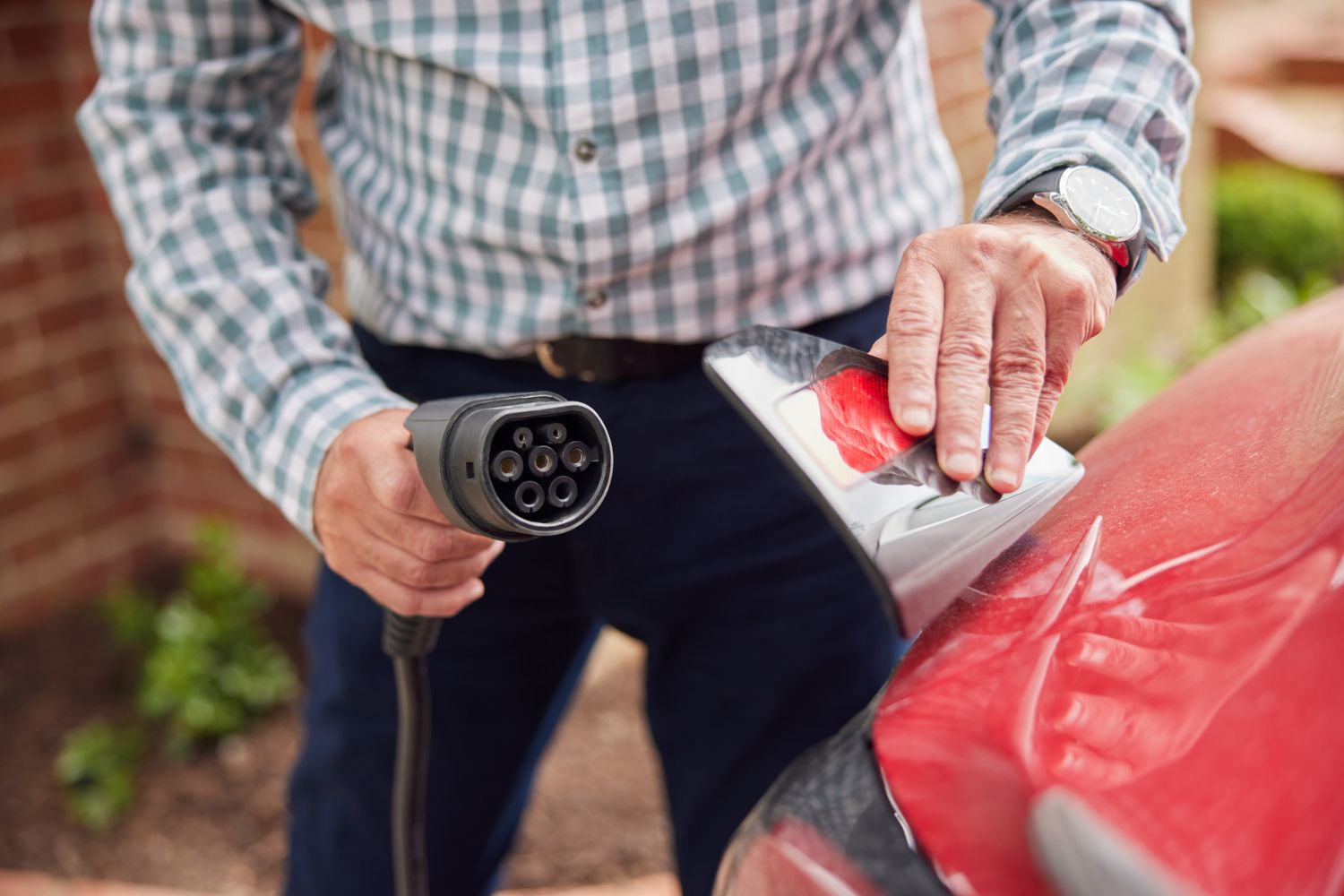
Additional Costs and Considerations
After planning and budgeting for an EV charger at home, homeowners can consider some additional costs, including for electrical work, dual charging requirements, and tax credits.
Electrical Work
Several electrical projects may be required to install an EV charger at home. In most cases, homeowners are discouraged from doing this work unless they have professional training as an electrician. Instead, it’s best to hire a professional to step in. But how much does an electrician cost? It depends on the project and the electrician’s rates, which can be by the hour or at a flat rate; however, adding wiring for a new outlet costs between $6 and $12 a linear foot.
New Breaker Box Installation
A breaker box, also known as an electrical panel, is a metal box that houses circuit breakers or fuses within a building. It receives power from the utility and distributes it as required throughout a home. When homeowners are installing a new EV charger station, it may be necessary to upgrade the breaker box. This is especially true in older homes that weren’t built with the same powering capabilities that today’s households have.
A new breaker box can cost between $1,500 and $4,000. The final cost depends on the distance and load the new box needs to carry. Not updating a breaker box can overload the system and lead to tripped circuit breakers or even electrical fires.
Dual Charging and Powersharing
For households with more than one electric vehicle, a dual charger helps ensure that multiple vehicles can be charged safely and efficiently at the same time. When equipped with a powersharing feature, a charger can better balance the electrical load between two vehicles.
Adding a dual charger with powersharing costs anywhere from $1,000 to $1,500. However, this cost range is for the installation of a basic model. Opting for a model with advanced features, including smart scheduling (charging can be programmed to start and stop at different times), energy monitoring (real-time monitoring limits energy consumption), and mobile app integration.
Tax Credit
Property owners will want to be aware of several home improvement tax credits, including one for EV chargers. As of January 2023, the Internal Revenue Service (IRS) is offering a tax credit of up to 30 percent of the cost of purchasing and installing a charging station.
It’s important to note that this tax credit is subject to change and may expire or undergo significant modifications in the future, so homeowners will want to confirm that they qualify before counting on a credit to help absorb some of their initial charger installation costs. There may also be state or local government incentives or tax credits to explore.
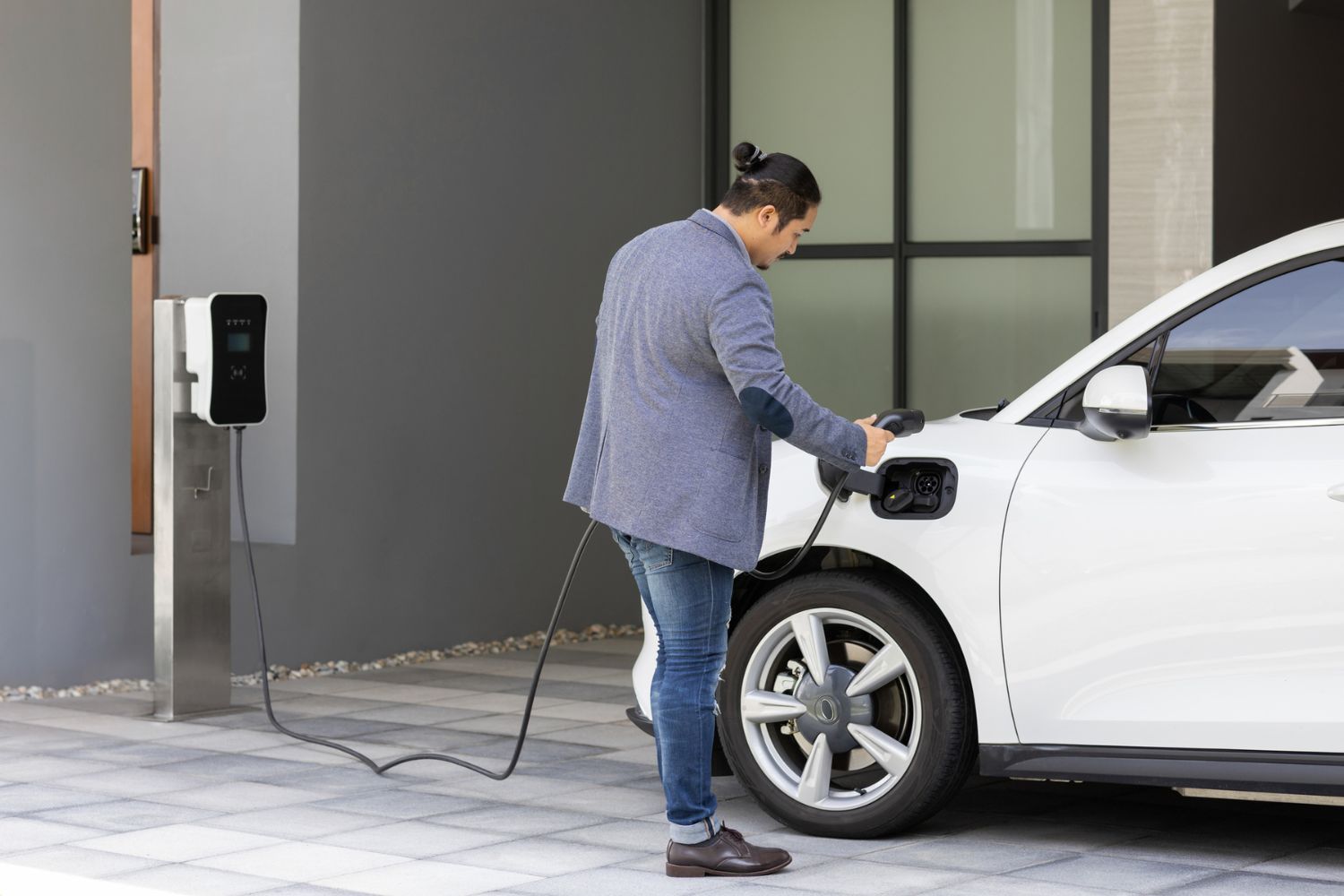
Types of EV Chargers
When homeowners are accurately estimating an EV charging station cost, the most crucial factor is the type of charger. As explored below, there are three EV charging station levels for homeowners to choose from, all with unique advantages, drawbacks, and price ranges.
| EV Charger Type | Average Cost (Materials Only) |
| Level 1 | $300 to $600 |
| Level 2 | $600 to $1,200 |
| Level 3 | $12,000 to $35,000 |
Level 1
A Level 1 EV charging station is the most affordable type available, though it also has several limitations electric vehicle owners should know about.
The main difference between a Level 1 charger and the others is that it’s portable. They’re often free with a car purchase, though a replacement can cost between $300 and $600. Installation is as simple as plugging it into a 120-volt outlet.
The main disadvantage of Level 1 chargers is that they can take 24 hours to fully charge a battery, with an hour of charging time providing only 2 to 5 miles of driving range.
Since the chargers are portable, many electric car drivers keep a Level 1 EV charging station with them when they’re away from home or for long drives where a backup charging solution can be beneficial.
Level 2
A Level 2 EV charging station has a higher installation cost than Level 1 stations, but they charge batteries much quicker. A full charge can be reached in just a few hours.
Homeowners can expect to pay between $600 and $1,200 to install a Level 2 charging station, with the final cost heavily dependent on whether the station is portable or mounted and hardwired to the home. Level 2 stations require a 240-volt outlet, so some electrical modifications or upgrades may be needed and can raise the installation cost.
But with the ability to add 10 to 40 miles of driving range per hour, the added costs can be quite beneficial for homeowners who regularly depend on an electric vehicle to get them from point A to point B with minimal charging disruptions.
Level 3
Level 3 EV charging stations are the most expensive but are designed for commercial use and are rarely installed in residential homes. With installation costs ranging from $12,000 to $35,000, they’re typically out of budget for most homeowners and don’t provide the appropriate return on investment (ROI) for property owners to consider them.
One scenario where they may be worth researching is for those living in multi-unit homes or complexes. Level 3 charging stations can charge multiple batteries simultaneously, adding hundreds of driving-range miles in under an hour.
Level 3 charging stations require 480 volts, meaning a second panel will likely need to be installed to support a Level 3 charging station in a private residence, whether for a single family or multiple units.
Benefits of Installing an EV Charger at Home
There are multiple pros and cons of electric cars and the charges needed to keep them operational. The following are some of the top benefits of installing an EV charger at home for property owners to consider.
Convenience
The convenience that comes with charging an electric vehicle at home is the most appreciated benefit of installing an EV charger. Instead of finding a public station and taking time to charge an electric car on the way home from work or before heading off on a trip, homeowners with a charging station in their garage can plug in their vehicle and soon continue with their day, minimizing disruptions.
Cost-Effectiveness
Home electricity rates tend to be lower than those charged at public charging stations, which average between $2.50 and $3.50 per hour. There are also no additional fees to absorb, including membership costs, which can add up to significant amounts over time.
Additionally, because there’s no wait time at public charging stations, homeowners won’t have to worry about lost wages or working opportunities while they’re charging. Some homeowners can also take advantage of off-peak savings when charging their vehicles at home. By charging overnight or during other off-peak hours, homeowners can take advantage of lower rates and reduce their charging costs.
Predictability
Some public charging stations can see long lines and wait times, especially during high-traffic periods. There’s peace of mind that comes with the predictability of at-home chargers when homeowners know they won’t have to wait to charge their vehicles.
EV chargers at home help homeowners have better control over their time and budget. Predictable charging metrics allow homeowners to keep their cars operational without a lot of undue stress.
Battery Health
Studies are beginning to show that frequent usage of Level 3 charging stations can damage electric vehicle batteries. While using them on a road trip or during a busy day of errands is OK, relying on them for regular charging can negatively affect battery performance.
Homeowners with their own charging stations can rest easy, knowing that their batteries aren’t overcharged, since Level 3 stations are rarely installed in residential spaces. Avoiding overcharging will allow batteries to last longer and reduce maintenance costs and premature vehicle replacement.
Increased Property Value
As electric vehicles become more popular, so will the demand for in-home chargers from home buyers. Whether selling or renting, property owners who can advertise EV chargers are more likely to see less negotiating and potentially higher offers from electric vehicle owners who know the value of an in-home charging station.
Just as working with one of the best solar companies, such as SunPower or Tesla, will help a homeowner maximize their return (ROI) on solar panels, choosing the best charging station type, brand, and installation company can help ensure that property value is increased as much as possible when an at-home EV charger is being installed.
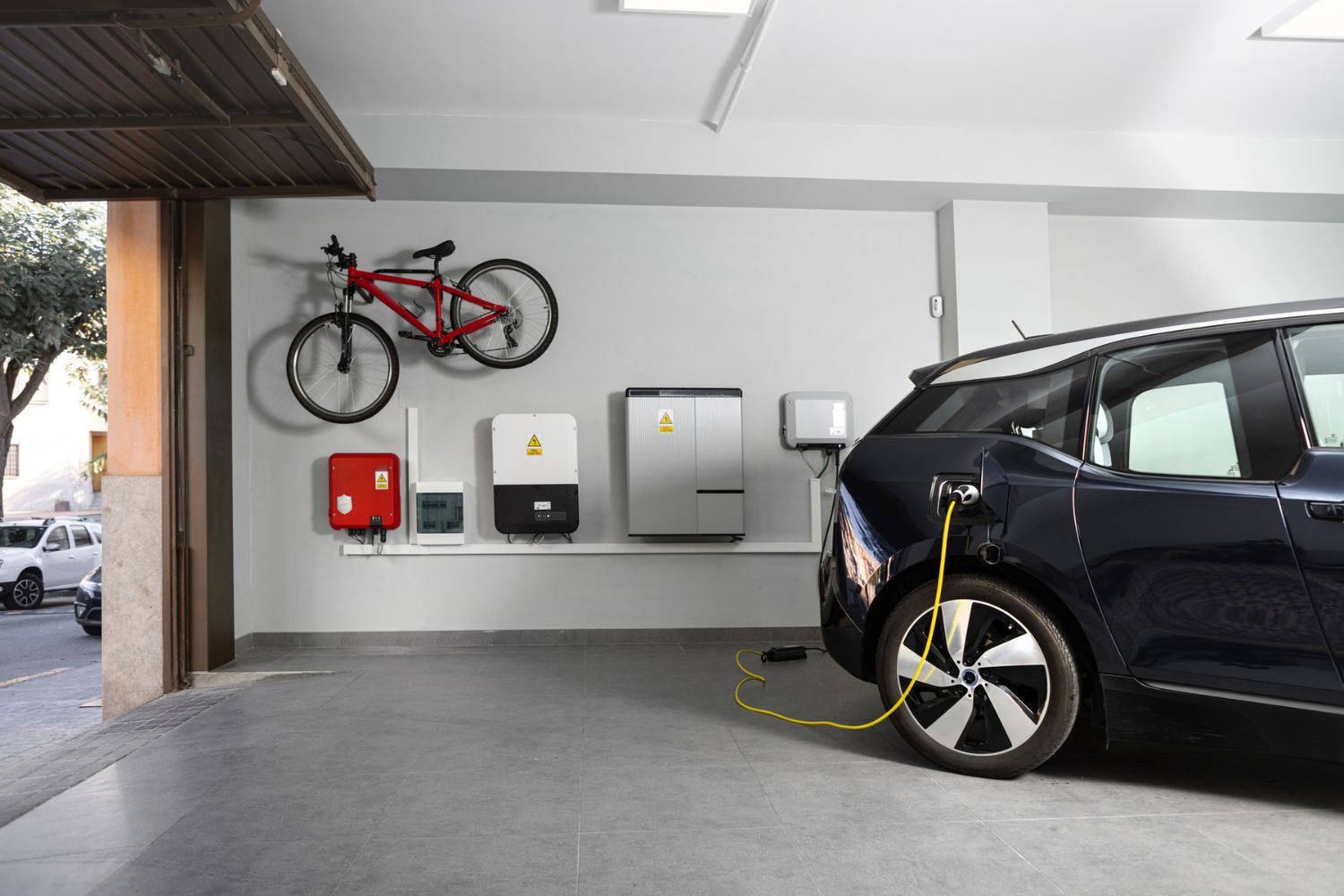
Installing an EV Charger at Home: DIY vs. Hiring a Professional
While taking a DIY route may seem like the best way to save on home charging station costs, it’s not recommended. Hiring a professional will always be the safer option for several reasons.
Installing an EV home charger requires working with high-voltage electrical lines. Even experienced DIYers may not know enough to avoid mistakes, which could lead to electrocution or fires. When electricity is involved, it’s always a job best left to licensed electricians.
Code compliance is another reason to hire a professional. Improper DIY installation may not meet specific codes and regulations. This leads to the next point, which is permits. DIY installs likely won’t pass inspections that come along with the permits required for EV charger installation.
Another reason to avoid DIY installation for EV chargers is the insurance risks. Home insurance may not cover any damage or injuries from unpermitted electrical work. Additionally, manufacturer warranties may be void if a licensed electrician does not install the charger.
One home charger scenario, though, can be a DIY job: Installing a Level 1 EV charger can be DIY appropriate if done safely. The benefits of Level 1 stations include the following:
- They don’t require voltage over 120 volts, so standard household outlets can often be used.
- They have fewer high electrical hazard risks than Level 2 stations.
- They don’t need to be hardwired, so they offer a portable charging solution.
- They don’t require permits if an existing 120-volt outlet is being used.
It’s important to remember that Level 1 stations offer DIY capabilities and cost less, but they also have slower charging times. When homeowners are deciding whether to go the DIY route or hire a professional for an EV charger installation, the answer will depend on the unique charging needs of the household.
How to Save Money on the Cost to Install an EV Charger at Home
A home EV charging station is an investment, but that doesn’t mean there aren’t ways to minimize costs. What follows are some money-saving tips for property owners to consider that address installation costs and some of the hidden costs of owning an electric car.
- Research local incentives. Research government incentives and rebates for EV charging station installation to help absorb some of the initial costs.
- Choose the right charging station. With a variety of charging types, brands, and connection options to choose from, finding the right charging station is essential to avoid overpaying for unneeded features.
- Consider location carefully. Install the charger as close as possible to the electric panel to minimize costly modifications.
- Timing matters. To save on labor costs and minimize disruptions, consider installing the charger during another home renovation or when other electrical work is needed.
- Share costs with neighbors. If anyone nearby may be considering installing an EV charger at home, see if there are ways to save on installation costs through contractor discounts.
- Harness solar power. To reduce utility bills while contributing to a greener environment, consider using solar panels to charge electric cars.
- Don’t abandon public stations. While a home charging station offers convenience, make use of free EV charging stations while on errands or at work to cut down on home electricity costs.
- Budget for batteries. While electric car batteries are designed to last, they eventually need to be replaced at a cost of up to $20,000. Start budgeting now to avoid surprise costs down the line.
Questions to Ask About Installing an EV Charger at Home
Asking a professional the right questions about installing an EV charger at home can minimize hiccups. Consider asking the following questions when searching for one of the best EV charger installers.
- How long have you been installing EV chargers?
- Are you licensed and insured for this type of work?
- Are you familiar with local building codes and permitting requirements for EV charger installations?
- Is handling the permitting process part of your services, or do I need to address permits?
- Can you recommend the best home EV charger for my needs and electrical system?
- Do you have experience with the best brand or model?
- Does your installation quote include all costs associated with installation, or are there potential additional costs that might arise?
- How soon can you schedule my installation?
- How long will the installation take?
- Do I need to be home during the installation?
- Will my existing electrical panel and service capacity support an EV charger?
- Are EV chargers safe?
FAQs
While there can be initial costs, having an in-house EV charger offers several benefits that can give electric car owners peace of mind and confidence in their vehicle’s performance. For electric car owners still trying to decide whether an at-home charging station is the more cost-effective option, the following frequently asked questions may provide additional insight.
Q. Is it cheaper to charge EV at home or at a charging station?
Charging EVs at home rather than at a public charging station is cheaper. While an EV charging stations map may share free stations, many cost between $2.50 and $3.50 per hour. Some electric car owners pay monthly membership fees instead for access to public charging stations. However, residential electricity rates are often the most affordable.
Q. Can you install two EV chargers in one house?
Yes, one house can accommodate two EV chargers. But there are a few things to consider, with electrical capacity being one. Not all electrical systems can handle two chargers, and modifications may be required. Electric vehicle owners are also encouraged to consider their charging needs, as one charger may be enough to match or exceed driving-range requirements.
Q. How long does it take to install an EV charger?
Every EV charger installation is unique, and the time it takes to complete the installation can depend on the connection type, location, and the home’s existing electrical system. However, trained EV charger installers can typically install a working and thoroughly tested charging station in as little as 2 hours.
Q. What size EV charger do I need?
There are three EV charger sizes, or types, to consider. A Level 1 is ideal for someone with low driving-range requirements and provides around 3 to 5 miles per hour of charging. A Level 2 charger is the most common and provides up to 12 to 80 miles of range per hour of charging. A Level 3 can provide 3 to 20 minutes of range per minute of charging but is typically used only in commercial locations.
Q. Are home electric car chargers safe?
Yes, home electric car chargers are safe when installed and used correctly. This is especially true for home charging stations certified by Intertek (ETL) and Underwriter’s Laboratory (UL). Such stations undergo rigorous testing, with electricity flowing through the cord only once it’s connected to a vehicle. Professional installation is recommended for optimal safety.
Sources: HomeAdvisor, Fixr, J.D. Power
